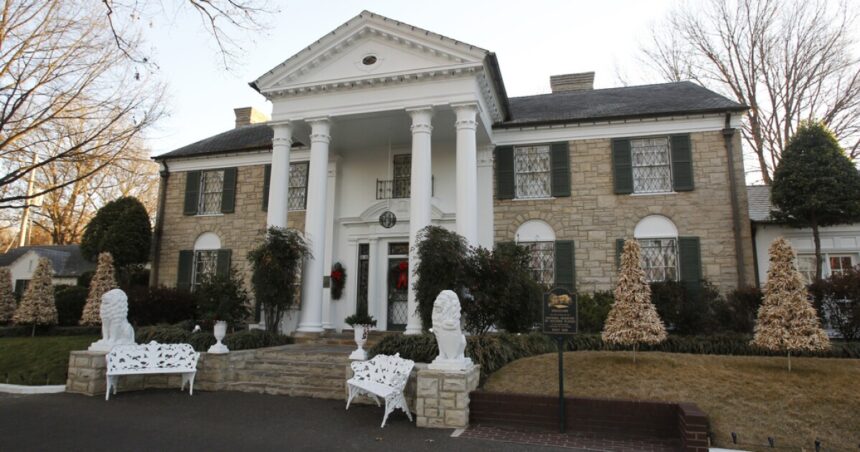A woman from Missouri has been taken into custody for allegedly organizing a plot to deceive Elvis Presley’s family by attempting to sell off his Graceland estate and assets in a secretive foreclosure auction that was halted by a judge, as reported by the Justice Department on Friday.
Lisa Jeanine Findley, aged 53 and residing in Kimberling City, is accused of falsely asserting that Presley’s daughter had borrowed $3.8 million from a fictitious private lender and had utilized Graceland as collateral for the loan prior to her demise last year, according to prosecutors. Findley then purportedly threatened to auction off Graceland to the highest bidder unless Presley’s family paid a settlement of $2.85 million.
Findley assumed the identities of three different individuals allegedly connected to the counterfeit lender, forged loan paperwork, and issued a fake foreclosure notice in a Memphis newspaper announcing the auction of Graceland in May, prosecutors claimed. The auction was intervened by a judge following a lawsuit from Presley’s granddaughter.
Experts expressed bewilderment at the audacious endeavor to sell one of the most iconic properties in the nation using names, emails, and documents that were quickly identified as fraudulent.
Graceland was transformed into a museum and tourist attraction in 1982, attracting hundreds of thousands of visitors annually. Adjacent to the museum stands a large entertainment complex inspired by Presley, owned by Elvis Presley Enterprises. The charges were announced on the 47th anniversary of Presley’s passing at the age of 42.
RELATED STORY | Self-proclaimed scammer claims involvement in foreclosure scheme targeting Elvis’ Graceland estate
“Ms. Findley purportedly exploited the widely known and tragic events in the Presley family as a chance to target the name and financial situation of the heirs to the Graceland estate, endeavoring to misappropriate what is rightfully the property of the Presley family for her own benefit,” stated Eric Shen, inspector in charge of the U.S. Postal Inspection Service Criminal Investigations Group.
No attorney for Findley, who used various aliases, was identified in court records. Calls made to a phone number linked to Findley were not returned promptly, and an email sent to an address associated with her in the scheme also went unanswered.
She faces charges of mail fraud and aggravated identity theft, with the former carrying a potential penalty of up to 20 years in prison. Following a brief appearance in federal court in Missouri, she remained in custody as per court documents.
In May, a public notice regarding the foreclosure sale of the 13-acre estate stated that Promenade Trust, overseeing the Graceland museum, owed $3.8 million after failing to repay a loan from 2018. Actor Riley Keough, Presley’s granddaughter, inherited ownership of the home and trust after her mother, Lisa Marie Presley, passed away last year. An attorney representing Keough did not respond immediately to a request for comment.
Keough filed a lawsuit alleging fraud, prompting a judge to halt the proposed auction via an injunction. Naussany Investments and Private Lending, the fictitious lender allegedly created by Findley, claimed that Lisa Marie Presley had leveraged Graceland for the loan, according to the foreclosure sale notice. Keough’s lawsuit contended that Naussany submitted fraudulent documents regarding the loan in September 2023 and that Lisa Maria Presley had never taken a loan from Naussany.
RELATED STORY | Graceland is not for sale, Elvis Presley’s granddaughter Riley Keough says in lawsuit
Kimberly Philbrick, the notary listed on Naussany’s documents, asserted that she had not met Lisa Marie Presley or notarized any documents for her, as per the estate’s lawsuit. The judge noted that the notary’s affidavit raised doubts about “the authenticity of the signature.”
The judge intervened in May to stop the foreclosure sale of the beloved Memphis attraction, indicating that Elvis Presley’s estate could have a strong case in arguing against the fraudulent auction of Graceland.
The Tennessee attorney general’s office had been conducting an investigation into the Graceland situation and later confirmed in June that the probe had been turned over to federal authorities.
A statement sent to The Associated Press after the auction was halted asserted that Naussany would not proceed as a crucial document and the loan were recorded and obtained in a different state, necessitating legal action in multiple states. The statement, dispatched from an email address cited in court documents, did not specify the other state.
Following the collapse of the scheme, Findley allegedly attempted to shift blame to a Nigerian identity thief, according to prosecutors. An email dispatched on May 25 to the AP from the same email as the previous statement claimed in Spanish that a Nigerian fraud syndicate was behind the foreclosure auction attempt, targeting elderly and deceased individuals in the U.S. to perpetrate online theft.





